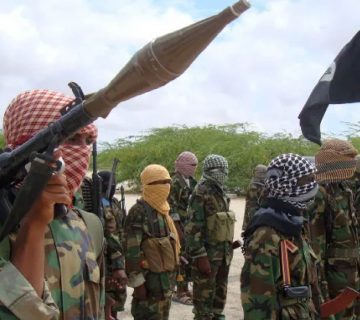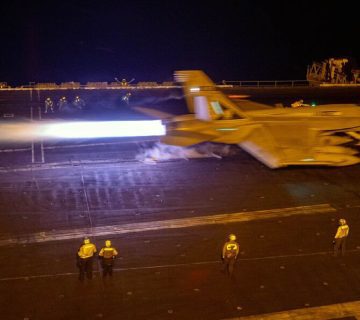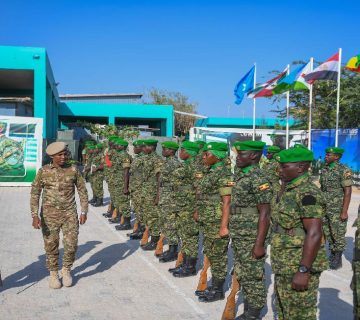Background
Despite years of international efforts and billions of dollars spent, sustainable peace, security, and stability remain elusive in Somalia. Currently, it is estimated that approximately 5.4 million people in the country need food assistance. About 2.6 million people are internally displaced.The militant group, al Shabab, remains a formidable force, greatly threatening stability and security in Somalia, and in other parts of East Africa. Al Shabab regularly conducts deadly terrorist attacks, including in Mogadishu and against the bases of the multinational African Union (AU) peacekeeping force in Somalia (AMISOM), while the country’s national security capacity remains weak. Months ago, the UN Security Council (UNSC) delayed a plan to scale down AMISOM in Somalia after finding that the fledgling, poorly equipped Somali government security forces were not sufficiently prepared to take over from the exiting forces.
Beefing up security cannot be the sole solution to insecurity in Somalia. Quite simply, military and security measures must be undertaken alongside socio-economic and political ones. Structural marginalization and exclusion, divisive politics, clan rivalries and disputes, displacement, persecution, endemic poverty, inequality, rampant corruption, a dire lack of transparency and accountability, the absence of basic economic infrastructure, a lack of social services, and unemployment, particularly among youth, are significant grievances that extremists often tap into and exploit to the detriment of peace and stability. The harsh and indiscriminate crackdowns, human rights abuses and extrajudicial killings, social integration challenges, poverty, and inequality in countries surrounding Somalia, serve to fuel anger, inflame tensions, and support the cause of extremists.
Despite the strength of the resilient Somali, the continued engagement of the international community in support of Somali-led efforts to stabilize and rebuild the country is critical, particularly in relation to building the capability of national security forces, establishing sustainable governing institutions, strengthening the country’s federal structure, encouraging reconciliation, strengthening respect for human rights, building resilience to climatic shocks, and promoting inclusive growth and development.
Recent developments
The general elections of 2020 are set to be the first one-person-one-vote election in Somalia. In earlier elections, elders of clans and sub-clans would vote through a hybrid electoral college model. 14,025 members from across the country would vote for 275 MPs in the lower house and 54 members of the Upper House Parliament. The Upper House represents the six federal states that consolidate Somalia, and has been selected by their presidents and state assemblies. The House will represent the existing and emerging federal member states. Upon nomination by the state executives of at least two candidates for each seat, the state assemblies will elect the 54 members of the Upper House. The State Assemblies will vote for each seat individually, with special arrangements for Somaliland and the Hirshabelle regions. Each regional state will reserve 30 per cent of its seats in the Upper House for exclusively female candidates. Regional elections must take place this year, starting from November 2018. However, these elections have come under significant pressure.
In September, the leaders of Somalia’s Federal Member States (FMS) suspended ties with the Federal Government of Somalia (FGS) in what is largely seen as a significant blow to the already weak relationship between the two. The House boycotted the joint opening session of parliament, which was presided over by President Farmajo. Five presidents of the six federal states of Somalia have come together to put pressure on the President to deliver on his promises.They have formed the Council of Inter-State Cooperation (CIC) of Federal Member States of Somalia, even though the country already has the National Leaders’ Council that also includes them and President Farmajo. The council held a two-day meeting in Kismayu, the capital of Jubbaland State at the beginning of September, during which they castigated the government for failing in the fight against al Shabab and the legislation process.The meeting was attended by five of the six regional presidents: Abdiweli Mohamed Ali Gaas (Puntland), Ahmed Dualle Geelle Haaf (Galmudug), Mohamed Abdi Ware (Hirshabelle), Sharif Hassan Sheikh Aden (South West State), and Sheikh Ahmed Madobe of Jubaland, who hosted the meeting.
At the end of September 2018, Mohamed Abdi Ware (Hirshabelle) reached a deal with the central government. The move is part of the central government’s efforts to dismantle the Council of Inter-State Cooperation (CIC). The heads of the four other Federal States (Galmudug, Puntland, Jubaland, and South West State) will only resume ties with Mogadishu until their demands are met.In October 2018, the remaining CIC members therefore formed a new political party, the National Progressive Party, and agreed to create a joint integrated security force drawn from the four regional states.
The remaining regional states do not agree with Farmajo on certain key issues affecting Somalia. One of those issues is the relationship between Somalia and the United Arab Emirates (UAE), which soured in April after Somalia refused to sever its ties with Qatar. In response, the UAE has suspended its military training program in Somalia, running since 2014. Additionally, president Farmajo and his government have paid little attention to the grievances of the Federal Member States, and created their own cronies in most of the states to make life difficult for their leaders. With elections coming up, the leaders of the states are already facing stiff competition from candidates said to be sponsored by Villa Somalia.
Experts on Somalia politics say the new council is likely to weaken the Election Committee by portraying it as incapable of conducting elections in the five states. Regional states are required to hold elections starting November in the run up to the 2020 vote.The latest row between the leadership of the Federal Member States and the Federal Government of Somalia is a classic example of a power tussle between two layers of government that should be working seamlessly. It is of incremental importance that both sides work together to make sure that this row does not spiral out of control and jeopardize efforts to bring peace, security, and stability to Somalia.
Another aspect that creates tension in Somalia is clan violence. In Sool region, a territory claimed by both Somaliland and Somalia’s Puntland, fighting between rival clan militias left close to 100 dead in October 2018.Elders have since called for a ceasefire, but tensions between rival clans remain, and are something the Somalia federal and regional governments need to be wary of as it might jeopardize concerted efforts to counter al Shabab.



